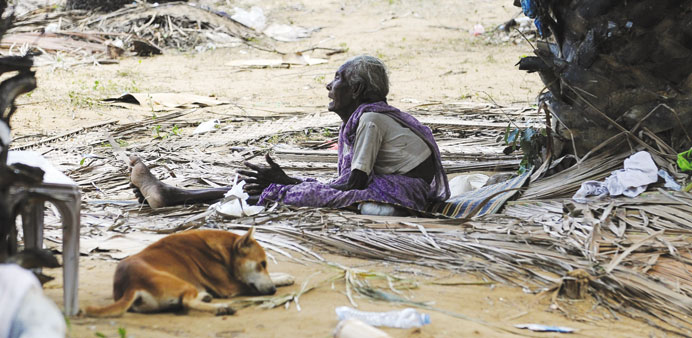An elderly Sri Lankan Tamil sits among the rubble of a village near Puthukkudiyiruppu on April 24, 2009.
Sri Lanka said it had “nothing to hide” yesterday as it began compiling a death toll from its war against Tamil separatists, after allegations of mass killings of civilians. While rights activists expressed scepticism at the project, organisers said it would reveal the true cost of one of Asia’s bloodiest conflicts which ended when troops routed the Tamil Tiger rebels in May 2009.
The start of the six-month “census” comes after the dispute over the scale of the killings in the final phases of the conflict dominated a Commonwealth summit hosted by Sri Lanka earlier this month.
UN bodies have said as many as 40,000 civilians may have died in the final weeks of combat—a claim that has been repeatedly rejected by President Mahinda Rajapakse and his mainly ethnic Sinhalese regime.
“The government has nothing to hide,” P B Abeykoon, the top civil servant in the ministry of public administration, who will supervise the census, told a press conference yesterday.
“A lot of people have come out with various accusations with their own figures. We will come out with the real facts,” Abeykoon added.
The president announced the start of the census on his website in a brief statement on Wednesday evening.
The statement said the department of census and statistics would conduct what it called an “island-wide census to assess the loss of human life and damage to property”, adding that work would begin on November 28.
The six-month census would see some 16,000 officials fan out across the island to conduct the survey in more than 14,000 villages, including in the mainly Tamil north of the island.
Rajapakse has previously insisted no civilians died in the finale to the war and has said there was no need for international investigators to conduct their own separate inquiry.
But international pressure has been steadily building and Rajapakse was sorely embarrassed when the leaders of Canada, India and Mauritius all boycotted the Commonwealth meet in protest at Colombo’s rights record.
Britain’s Prime Minister David Cameron did attend but he infuriated Rajapakse by paying an historic visit to the war-torn Jaffna region.
After meeting survivors and relatives who had lost loved ones during the war, Cameron warned he would lead a push for an international probe unless Sri Lanka produces credible results of its own by March.
Asked about the claims of 40,000 civilian deaths, Abeykoon said the census showed the government’s determination to seek the truth.
“Why should we go for a census if we have anything to hide? We are trying to get a clear picture for ourselves,” he said.
But a leading rights group countered that Sri Lanka has set up several investigations in the past into deaths and disappearances but has not released the findings.
“A number of government inquiries have already been established and there has never been any kind of accountability, so a new one holds no weight whatsoever,” said Suhas Chakma, director of the New Delhi-based Asian Centre for Human Rights.
Chakma said the survey would not have credibility unless its terms of reference allowed it to determine whether international laws relating to war crimes had been broken. “If they are seeking to assuage the sentiments of the international community and the local people, they need to determine whether war crimes have been committed,” he told AFP.
Rajapakse said at the Colombo summit that Sri Lanka needed more time to conduct its own investigations, urging his peers “to trust us”.
The census was one of the recommendations of a government-appointed panel that submitted a report last year. D.C.A Gunawardena, the head of the census department, told reporters that his teams would try to determine the numbers of dead, missing, or maimed by the conflict as well as the extent of property damage.
“The public will be asked to substantiate the claims of deaths, missing and property damage,” he said at the launch alongside Abeykoon.
More than 100,000 people are believed to have been killed during the course of the war, according to previous UN figures.
The war ended when Tamil Tiger leader Velupillai Prabhakaran was killed in a stronghold in the island’s northeast.
While Jaffna held its first provincial elections since the war in September, with the main Tamil party winning by a landslide, the vote was seen as having done little to address long-standing demands for greater autonomy.
The survey was to only rely on information from immediate family members, not third-person claims of deaths and disappearances.
A key Tamil minority party expressed doubts.
“In some cases the entire family has been killed, and if the census does not take into account details provided by third persons there could be a problem in the accuracy,” said Ponnambalam Selvarasa, a member of parliament for the Tamil National Alliance.
The Asian Centre for Human Rights called the census a “sham,” saying it was an attempt to scuttle a resolution to be discussed by the UN Human Rights Council in March.
The resolution would authorise a full and independent international inquiry into alleged war crimes in Sri Lanka.

